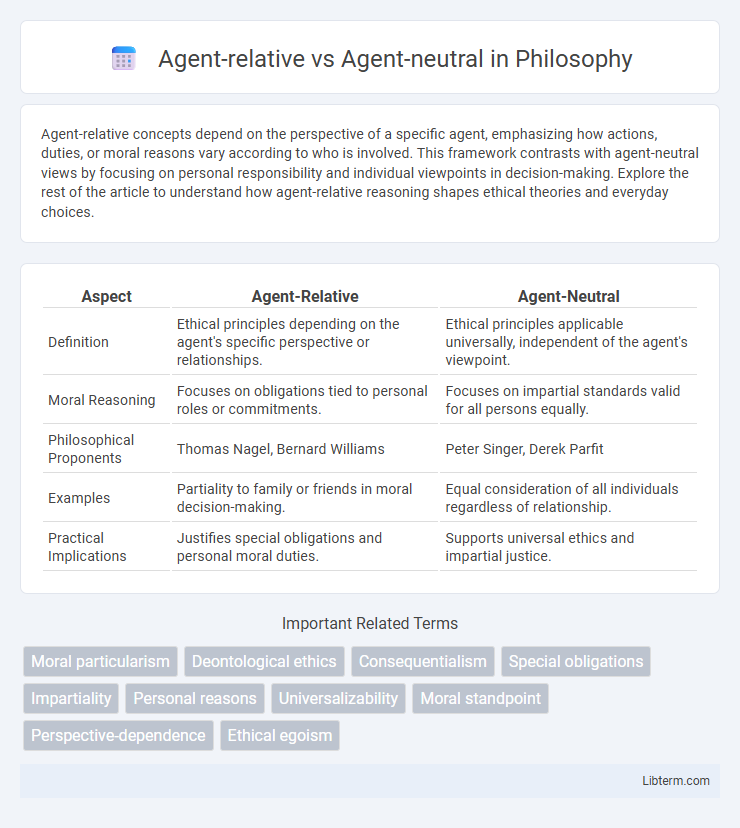Agent-relative concepts depend on the perspective of a specific agent, emphasizing how actions, duties, or moral reasons vary according to who is involved. This framework contrasts with agent-neutral views by focusing on personal responsibility and individual viewpoints in decision-making. Explore the rest of the article to understand how agent-relative reasoning shapes ethical theories and everyday choices.
Table of Comparison
| Aspect | Agent-Relative | Agent-Neutral |
|---|---|---|
| Definition | Ethical principles depending on the agent's specific perspective or relationships. | Ethical principles applicable universally, independent of the agent's viewpoint. |
| Moral Reasoning | Focuses on obligations tied to personal roles or commitments. | Focuses on impartial standards valid for all persons equally. |
| Philosophical Proponents | Thomas Nagel, Bernard Williams | Peter Singer, Derek Parfit |
| Examples | Partiality to family or friends in moral decision-making. | Equal consideration of all individuals regardless of relationship. |
| Practical Implications | Justifies special obligations and personal moral duties. | Supports universal ethics and impartial justice. |
Introduction to Agent-Relative and Agent-Neutral Concepts
Agent-relative and agent-neutral concepts distinguish moral perspectives based on the standpoint of agents involved. Agent-relative reasons prioritize the interests or commitments of a specific agent, often aligning with personal obligations or special relationships. In contrast, agent-neutral reasons apply universally, valuing outcomes or principles impartially regardless of individual identities.
Defining Agent-Relative Morality
Agent-relative morality centers on the idea that moral obligations and reasons are specific to an individual's perspective, roles, or relationships, emphasizing personal commitments and duties. This theory contrasts with agent-neutral morality, which holds that moral reasons apply universally, independent of who the agent is. Defining agent-relative morality involves recognizing that moral reasons can vary based on the agent's specific situation, relationships, and identity, highlighting the importance of personal standpoint in ethical decision-making.
Explaining Agent-Neutral Morality
Agent-neutral morality evaluates actions based on universal principles that apply impartially to all individuals, regardless of who performs them. It emphasizes the moral significance of outcomes and fairness, treating everyone's interests with equal consideration. This ethical framework contrasts with agent-relative morality, which allows moral reasons to depend on the specific agent's perspective or role.
Historical Background and Philosophical Origins
Agent-relative and agent-neutral distinctions trace back to debates in moral philosophy regarding the basis of ethical obligations and practical reasoning. Agent-relative perspectives emphasize duties grounded in the agent's personal relationships or projects, rooted in Kantian ethics and the moral particularism tradition dating to Aristotle. Agent-neutral views align with utilitarian and consequentialist theories, advocating for impartiality and universalizability as central to moral judgments, emerging prominently in 19th-century utilitarianism.
Key Differences: Agent-Relative vs Agent-Neutral
Agent-relative perspectives prioritize the intentions, reasons, and commitments specific to an individual agent, emphasizing personal responsibility and subjective moral judgments. In contrast, agent-neutral approaches adopt an impersonal standpoint, focusing on outcomes and principles applicable universally, regardless of who is involved. The key difference lies in agent-relative views uniquely valuing personal motives and relationships, whereas agent-neutral frameworks seek impartiality and generalizability in ethical evaluation.
Examples of Agent-Relative Ethical Theories
Agent-relative ethical theories emphasize moral obligations that depend on an individual's specific roles or relationships, such as family loyalty or promises made. Examples include Kantian ethics, where duty is tied to personal commitments, and Ross's prima facie duties, which highlight obligations like fidelity and gratitude unique to the agent's situation. These theories contrast with agent-neutral ethics, which prescribe impartial moral principles applicable to all agents regardless of their identity or relationships.
Examples of Agent-Neutral Ethical Theories
Utilitarianism exemplifies an agent-neutral ethical theory by evaluating actions based on overall happiness or utility irrespective of the agent performing the act. Kantian ethics, particularly in its formulation of universal moral laws, treats moral duties as binding regardless of who the agent is, emphasizing impartiality. Another example is consequentialism, which assesses the morality of actions solely by their outcomes without privileging any specific agent's perspective or interests.
Major Philosophers and Their Perspectives
Immanuel Kant is a major philosopher who emphasized agent-neutral principles in his moral philosophy, arguing that moral duties apply universally regardless of individual perspectives. In contrast, Derek Parfit explored agent-relative reasons, highlighting the significance of personal commitments and individual perspectives in ethical decision-making. Thomas Nagel contributed to the debate by examining the tension between agent-relative and agent-neutral viewpoints, focusing on how subjective experience impacts moral reasoning.
Practical Implications in Moral Decision-Making
Agent-relative reasons prioritize an individual's personal commitments and relationships, significantly influencing moral decisions by emphasizing loyalty, promises, and special obligations. Agent-neutral reasons apply universally, urging impartiality and equal consideration of all affected parties in ethical deliberations. Balancing these perspectives shapes practical moral judgment by guiding when to uphold personal bonds or prioritize broader, objective principles.
Conclusion: Ongoing Debates and Future Directions
Ongoing debates in the discussion of agent-relative versus agent-neutral ethics highlight the complexities of reconciling personal commitments with impartial moral principles. Future research is expected to explore hybrid frameworks that integrate agent-relative motivations within broadly agent-neutral ethical theories, aiming to address challenges in moral psychology and practical decision-making. Advances in cognitive science and normative ethics will play a crucial role in refining these approaches to better capture human moral behavior.
Agent-relative Infographic

 libterm.com
libterm.com